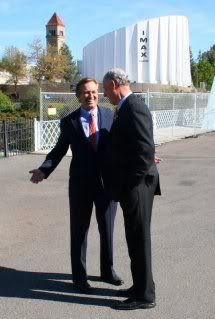Another Green Monday: Robert F. Kennedy, Jr.
I didn't get back home until pretty late Thursday night, hence the delay for the recap of Robert F. Kennedy Jr's talk in Spokane. Plus, it took a while to process my thoughts on the event because there was a pleasant buzz throughout the evening - it was everything I had dreamed of and more.
I've been a lifelong Kennedy buff. My interest in public service began with the story of RFK Jr's. father but as Tim Connor said, to see the manifestation of his DNA, for his son to be such a powerful conduit to his father's legacy of speaking out against injustice, was truly awesome. It's never easy finding your own place in the world - hard as hell if you grew up like him.
Robert Kennedy Jr. and Jim Whittaker. Photo by Tim Connor.
"When you have chosen your part," his father once underlined in Emerson's essays on self-reliance, "abide by it, and do not weakly try to reconcile yourself with the world…Adhere to your own act, and congratulate yourself if you have done something strange and extravagant, and broken the monotony of a decorous age."
But Robert F Kennedy Jr found his place in the river and there he was, in Spokane, speaking from the heart about tremendously important issues such as the air we breathe, the water we drink and how energy is the "new arms race."
Jim Whittaker, the first American to summit Mt. Everest and who scaled Mt. Kennedy with RFK Jr.'s father, gave a warm introduction. “He just got caught up in this wonderful, magical planet,” Whittaker said. “But the most important thing about all of this, is that we have an individual who’s willing to fight for us. I has been said that courage is the first and foremost of all human attributes, because with that one attribute come all of the others. Here’s someone who can go out and confront people who are polluting the planet, that are taking a healthy lifestyle away from our children. Here’s a guy who will go out and do it.”
Kennedy then spoke for an hour and a half. He began to discuss the origins of the Waterkeeper Program with the cleaning up of the Hudson River. Now, the program has grown into an international Waterkeeper movement, which he now presides over. It has spawned more than 200 Waterkeeper organizations around the world, and the Spokane Riverkeeper and Lake Pend Oreille Waterkeeper are among the most recent additions. (Also the Iraq Riverkeeper.)
Then he took on energy, specifically coal pointing out the environmental and public-health degradation caused by the myth of "clean coal."
Connor has a beautiful recap over at the Center For Justice which is hard to match called "Worth the wait":
He was similarly critical of large oil companies and the enormous public subsidies the companies receive through the federal tax code. He railed against corporations who buy political influence to tilt the economic playing field in their favor to ensure that they collect the benefits of public subsidies while the public pays the costs. He criticized politicians in both parties for “sitting on their hands” rather than confronting these excesses and working to level the playing field so that emerging, green energy technologies get at least an even chance to compete.
His talk was not all gloom and doom. Much of the latter part of his presentation was devoted to laying out a vision of an America energy future in which the nation would be losing its dependence on foreign oil more quickly than people think, because emerging technologies for electric vehicles are so promising. As candid as his assessment are about the abuses of capitalism, Kennedy was very clear that he believes in free market capitalism and how it can be a dynamic force for positive change if the public can vigilantly protect against undue and deeply corrupting corporate influence on government. He clearly believes and worked to persuade his audience Thursday night that green energy will be the path to a new American prosperity, if citizens can overcome ominous developments like the recent Citizens United decision by the U.S. Supreme Court. Kennedy warns that Citizens United is a already a broad door for deepening corporate corruption of U.S. politics and a the means for a new “tsunami” of corporate money into U.S. electoral politics, reversing reforms that Theodore Roosevelt enacted during his Presidency in the early part of the 20th century.
I keep coming back to an interview with Kennedy more than a decade ago. Reading it now, it seems even more relevant. "To me," he said in 1999 to TIME Magazine, "this is a struggle of good and evil--between short-term greed and ignorance and a long-term vision of building communities that are dignified and enriching and that meet the obligations to future generations. There are two visions of America. One is that this is just a place where you make a pile for yourself and keep moving. And the other is that you put down roots and build communities that are examples to the rest of humanity."
TIME Magazine asked him in reference to the Riverkeeper program: "Why choose this front rather than other humanitarian battles?"
"To me," he says, "the environment cannot be separated from the economy, housing, civil rights and human rights. How we distribute the goods of the earth is the best measure of our democracy."
That is our fight - and after listening to an environmental hero like Kennedy, embodying his father's spirit, I walked away Thursday night feeling inspired to make a difference.
